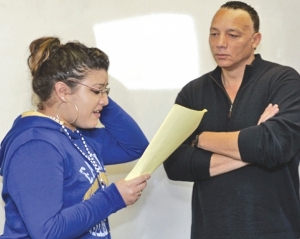Romeo and Juliet speak ... in Spanish
By Winkie Lee
Published in News on October 23, 2008 1:46 PM

News-Argus/BOBBY WILLIAMS
Spring Creek High School student Veronica Binar reads lines from "Romeo and Juliet" while Joseph Henderson, artistic director of Walltown Children's Theatre, listens. Henderson has been leading workshops at different Wayne County schools this week that have students studying the classic in English and Spanish. An abbreviated Spanish-language version of "Romeo and Juliet" will be performed Friday morning for students and Friday night for the public.
Veronica Binar looked shyly at the script she was holding, speaking in Spanish as the 14-year-old Juliet, the doomed heroine in Shakespeare's "Romeo and Juliet."
On Tuesday afternoon, the sophomore was standing in Edith Sosa's Spanish for Native Speakers classroom at Spring Creek High School. But, in spirit, she was on a balcony in Renaissance-era Verona, Italy.
Nearby was Romeo, aka actor Jose Velasquez of Walltown Children's Theatre from Durham. As he spoke to her, she gently moved a little closer toward him -- not close enough to be by his side, but close enough to show interest.
And she continued to keep her eyes cast down on the script.
After the workshop, the sophomore, whose classes include Theater Arts I, said she avoided looking at Romeo because, at this point in the scene, Juliet wasn't sure it was Romeo who was talking to her. It was dark outside, and there were no electric lights as there are today.
Veronica was one of several students who not only got to attend a workshop about Shakespeare's play, but to be a part of it as well.
The occasion was a visit from Velasquez and Walltown Children's Theatre's artistic director, Joseph Henderson, who this week have been giving Wayne County students a chance to experience Shakespeare in English and Spanish. On Friday morning, they will see the theater group perform an abbreviated, Spanish-language version of "Romeo and Juliet."
The public can see it at 7 p.m. Friday at the Paramount for $5. There will be English subtitles.
The visit, which was also made to Eastern and Southern Wayne and Charles B. Aycock high schools, was courtesy of the theater group, the National Endowment for the Arts, the North Carolina Arts Council and the Arts Council of Wayne County.
Henderson would speak about the play, then select students to come to the front of the classroom and read.
Some read lines in English, their second language. Others read in their native Spanish.
Henderson and Velasquez occasionally coached the students to help them more completely relate to the language, the characters and the story. After one young man read, Henderson walked over to him. "Good," he said. Then he told him to do it again, and this time to show the character's anger.
The student laughed. "Now I'm nervous," he said.
Then he read, infusing the lines with power. His fellow students applauded enthusiastically.
In addition to watching classmates read, the students saw Velasquez act out parts of the play and heard Henderson speak powerfully and enthusiastically about it.
Henderson's belief is that be it English, Spanish or any other language, the words in William Shakespeare's "Romeo and Juliet" are beautiful.
And that the story, even though it took place 450 years ago, is still relevant -- and vivid.
Romeo Montague was like that guy in high school, Henderson said. You know the one -- handsome and interested in meeting girls. He goes to the Capulets' party, to which he has not been invited, to see a girl in whom he is interested. Instead he sees Juliet and falls in love.
She falls in love, too, and wants to marry him.
Knowing their families would never approve, they wed secretly.
And then tragedy strikes. There is a fight. Romeo's best friend is killed. Then he kills the murderer, who is his wife's first cousin. To save his own life, he must escape, leaving Juliet behind.
Juliet, who might be pregnant, is now alone and being forced by her mother into an arranged marriage. She plots with the friar who married her and Romeo to take a potion that will make her appear dead for about two days. During that time, Romeo will return and they can run away together.
But it doesn't work out that way. Believing she is dead, Romeo kills himself. She comes to, realizes he has died and commits suicide.
For a little over an hour, Henderson and Velasquez did more than teach a classic. They brought it to life.
Afterward, some students spoke of how it made them see the story differently ... and how proud they were to watch a Hispanic acting the role and reciting his lines from memory and heart.
Jahelly Santiago, a junior, said he was intrigued by the peformance. He spoke of watching a stage version of "Romeo and Juliet" in his home country of Puerto Rico.
"It kind of like makes you get in the moment," he said. "You live it with them; you feel what they feel. I love how he (Henderson) was talking in English and how he told his helper (Velasquez) to do it in Spanish so that we could see it both ways."
"It was very inspiring," sophomore Antonio Romero-Cuevas agreed, adding that it is not often Hispanics here can see other Hispanics communicating in this way.
Romero-Cuevas said he hears people talk about immigration and not wanting Hispanics in the U.S. and said he wants to change the world so that people can unite.
"You can see a different culture's point of view and you can share ideas with other people."
